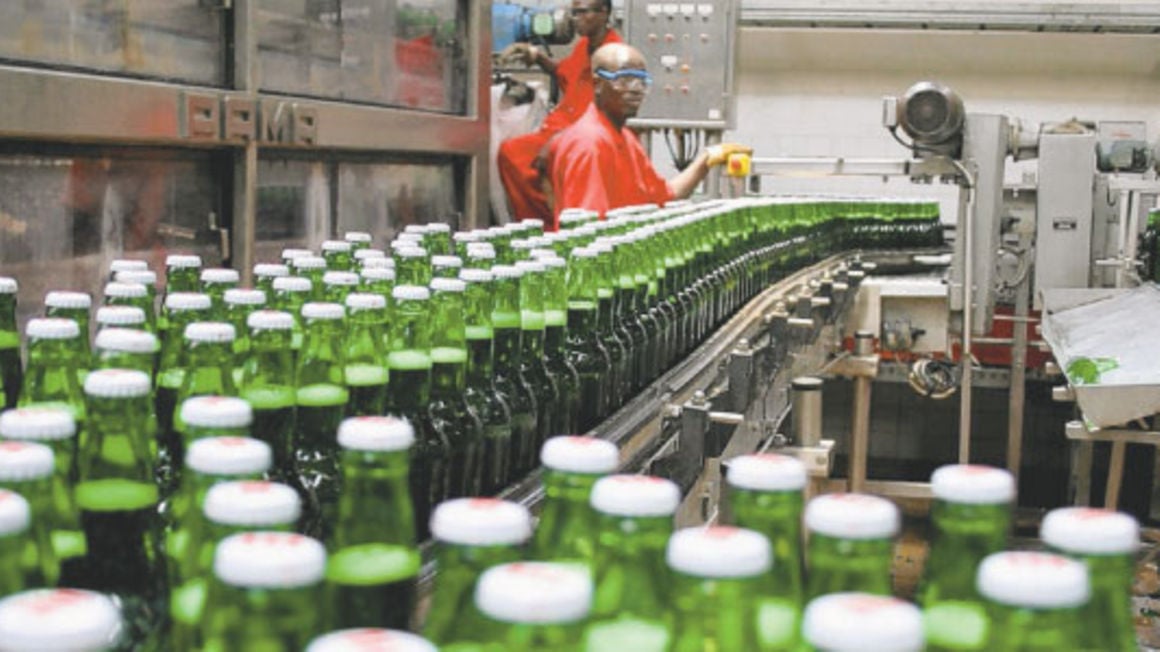
Technicians inspect beer bottles at a brewery. FILE PHOTO | NMG
Summary
- The Bill seeks to increase the minimum bottle size from the current 250 milliliters in efforts to curb the sale of alcoholic drinks in small packages that have been blamed for fuelling consumption among the youth.
- The proposed law looks set to make Kenya’s packaging threshold one of the highest and could force glass makers and brewers to rejig their production lines in a multimillion-shilling revamp to accommodate the larger bottles.
- The rising cost of beer and spirits has pushed cash-strapped Kenyans to cheaper alcohol, including some that are considered illicit drinks.
Sale of alcoholic drinks in bottles of less than 750 millilitres will be illegal if Parliament approves a proposed law that will trigger an increase in the prices of beer and spirits and put the drinks out of the reach of a majority of the youth.
The Bill seeks to increase the minimum bottle size from the current 250 millilitres in efforts to curb the sale of alcoholic drinks in small packages that have been blamed for fuelling consumption among the youth.
If passed, firms like East Africa Breweries Limited
will be forced to order for fresh bottles, rejig their production lines and increase the average cost of beer from the current Sh190 to at least Sh285 a bottle.
“The principal object of this Bill is to amend the Alcoholic Drinks Control Act, in order to ensure that packaging of alcoholic drinks are in quantities not below 750 millilitres,” says the Bill, which has been tabled in Parliament and set for debate.
“This is in order to deal with the menace of excessive drinking occasioned by the sale of very low quantities of alcoholic drinks, making it accessible to the youth,” adds the Bill sponsored by Wundanyi Member of Parliament Danson Mwakuwona.
Spirit brands like Kane Extra, Bluemoon and Hunters Choice are packaged in small quantities of 250 millilitres with prices ranging between Sh190 and Sh230, making them popular among low-income earners and the youth.
The lowest quantities of beer brands like Tusker Lite and Tuborg are packaged in 350 millilitres and sell at an average of Sh190 per bottle.
The proposed law looks set to make Kenya’s packaging threshold one of the highest and could force glass makers and brewers to rejig their production lines in a multimillion-shilling revamp to accommodate the larger bottles.
Those in breach of the packaging rule face a fine of Sh50,000, a jail term of six months or both, says the Bill.
EABL on Monday said that the new packaging rule will make alcohol expensive for low-income earners and hit the listed firm that is struggling to navigate restrictions imposed to curb the spread of Covid-19.
“Our volumes will drop because even now we have the 750 ml brands but the sales are low. Beer and the spirits will be inaccessible to low-income Kenyans. Even now, most people will buy the quarter (250 ml) and share so who will afford the 750 ml?” EABL spokesperson told the Business Daily.
A spot check in liquor outlets showed that a quarter or 250 ml of EABL branded Richot goes for Sh350 while the 750 ml package retails at Sh1,100.
The proposed increment on the minimum packaging of alcoholic drinks risks increasing consumption of cheap illicit drinks
The rising cost of beer and spirits has pushed cash-strapped Kenyans to cheaper alcohol, including some that are considered illicit drinks.
Senator Keg, a low-priced lager made from locally grown sorghum, has been one of the fastest growing brands for EABL in recent years due to huge demand from price-sensitive consumers.
Hundreds of Kenyans have been killed drinking illicit brews laced with dangerous chemicals such as methanol, battery acid and bleach to increase potency.
Kenya shut down bars on March 25 after reporting the first coronavirus case, occasioning an economic meltdown in the industry marked by thousands of job losses and permanent closure of some establishments.
Bars were partially reopened in September 28.
EABL’s net profit dropped to a six-year low on the State closure of bars to contain Covid-19 spread highlighting the impact of the restrictions on the industry.
The brewer’s net profit dropped 39 percent to Sh7 billion for the year ended June 2020, with net sales for the second half of the year plunging 29 percent.
EABL then rolled out a two-year Sh532 million ($5 million) recovery fund to help pubs and bars resume trade post-lockdown.





No comments :
Post a Comment